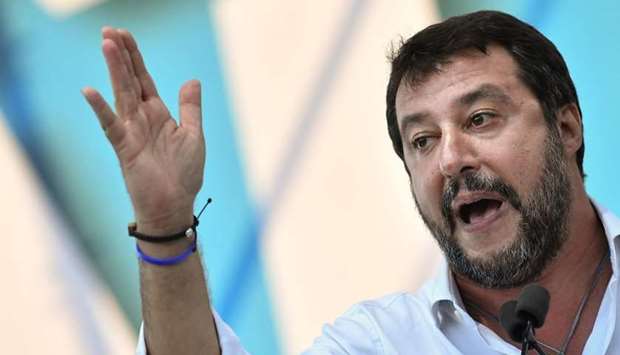Italy's far-right opposition leader Matteo Salvini has scored a historic victory in the first electoral test since losing his government job in August, results showed Monday.
In Umbria's regional election, the candidate backed by a Salvini-led coalition, Donatella Tesei, won 57.55 per cent of the vote, according to final results released by the interior ministry.
The result puts an end to 49 years of left-wing regional government in Umbria, and marks a stinging defeat for the governing parties in Rome, as their candidate Vincenzo Bianconi won only 37.5 per cent.
"We won by 20 points," Salvini wrote on Twitter.
Bianconi was supported by the centre-left Democratic Party (PD) and the anti-establishment Five Star Movement (M5S), who are uneasy partners in Prime Minister Giuseppe Conte's coalition government.
After the Umbria vote, "the days of the national government are numbered," Salvini told supporters overnight, as he celebrated a "clear and resounding" success.
A right-wing win in Umbria was widely expected. Elections were triggered by a cronyism scandal involving the outgoing centre-left administration.
Before Sunday's vote, Conte downplayed its national significance, saying it would not have any effect on his government, but the scale of the defeat could destabilise his fledgling ruling coalition.
The election "strengthens Salvini's claim that the M5S-PD government is politically illegitimate and that fresh elections must be called," Wolfango Piccoli, co-president of Teneo Intelligence, said.
The M5S was the biggest loser, winning a paltry 7.4 per cent of Umbria's vote, compared to 14.6 per cent in May's European elections and 27.5 per cent in 2018 general elections.
The M5S reacted by ruling out more common tickets with the PD in future local elections - which could make it harder for government parties to avoid losses in upcoming regional votes.
Umbria also confirmed the rightward tilt in Italy's conservative camp, as former premier Silvio Berlusconi's once-dominant Forza Italia party lost more ground to more extreme coalition allies.
Forza Italia took 5.5 per cent on Sunday, against nearly 37 per cent for Salvini's League and 10.4 for Brothers of Italy, another hard-right party led by the increasingly popular Giorgia Meloni.
Meloni called the results "a resounding slap [in the face] for the government." Salvini was deputy premier and interior minister until August, when he ended a 14-month alliance with the M5S and prompted a government crisis.
Riding high in opinion polls, he hoped to win the premiership after triggering snap elections, but he was stopped by the M5S forming an alternative ruling coalition with the PD, a former sworn enemy.
EU partners welcomed the sidelining of Salvini into opposition, as it meant they no longer had to deal with a populist who relished picking fights with Brussels on migration and budget discipline.
But the Umbria results show Salvini to be far from down and out, though Brussels may take solace from the fact he has recently toned down his anti-EU rhetoric, disowning his old anti-euro stance.

